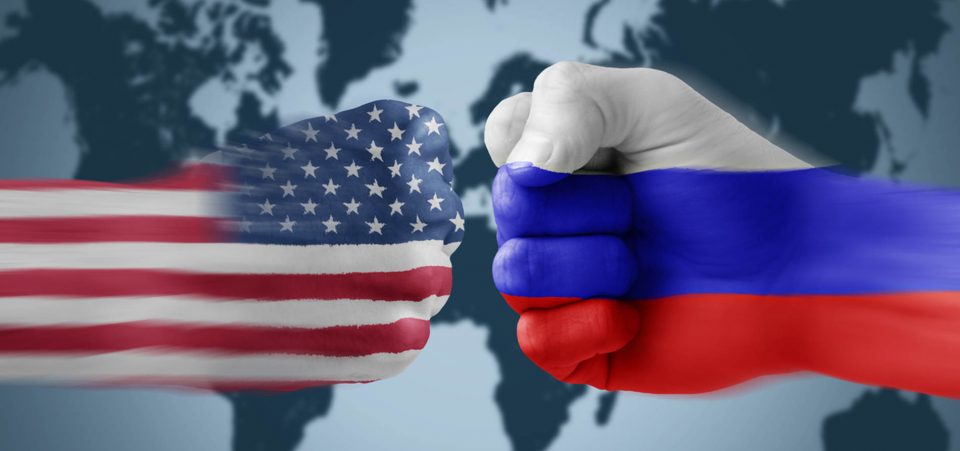World War 3 Could Start in This Ignored Region
World War 3 might be in the making and sooner than anyone expected. The potential epicenters of WW3 are multiplying with each passing week. The Middle East shows no signs of calming. The offensive against ISIS and other groups continues, while the U.S. and Russian superpowers may entertain sharply diverse ambitions over Syria and the future of the region.
As if the traditional WW3 hotspots weren’t enough, another is brewing again in Europe now. The U.K.’s divorce from the European Union (EU) is assuming tones not unlike King Henry VIII’s abandonment of the Catholic Church. That fueled tensions for centuries between the two leading European empires of the day, England and Spain, and Scotland.
Today, Gibraltar and Scotland could prove to be dangerous thorns against London’s plans. The match between Spain and the United Kingdom is back on in an ever more dangerous global geopolitical scenario. The two kingdoms have fought each other to dominate the seas since the 1500s.
Before Adolf Hitler tried to invade the U.K. in WW2, Spain tried the same thing in 1588, deploying a fleet of over 130 ships to attack the British Isles. Now, Brexit has refueled tensions and awakened old rivalries. Gibraltar is but four square miles in area, but it has served as a reminder of Britain’s ultimate win over Spain since the beginning of the 1700s. It remains a British overseas territory.
Yet, Gibraltar is surrounded by Spain. Once Britain is out of the EU, it loses its privileged access to Gibraltar. Now, British Prime Minister Theresa May said she would follow in the footsteps of none other than Margaret Thatcher in the Falklands. The Iron Lady deployed 30 ships and troops to force out Argentine occupiers from the archipelago located off the coast of Argentina in 1982.
The Falklands War, which started on April 2, 1982 and lasted until July 14 of that year left 1,000 soldiers dead. A British Conservative MP has urged May to show resolve to defend the people of Gibraltar—militarily that is. So much for the EU. If peace, the main reason why anyone still supports the EU, is frail there, what of the rest of the world?
It’s unlikely that a British military intervention over Gibraltar could spark WW3, but it would create a situation that other powers, like Russia, could exploit. The U.K. will replace its EU ties with stronger ones to the United States. Thus, Gibraltar risks weakening NATO, a prospect dear to Russia and Vladimir Putin. WW3 between Russia and the United States does remain a possibility.
The Central Intelligence Agency (CIA), much of Congress, and the mainstream media are sparing no effort in order to find links between Russia and Trump. In fact, there’s no evidence whatsoever that Trump has a cozy relationship with Russian President Vladimir Putin. Thus, the risk of the U.S. and Russia reaching a major collision that could ignite World War 3 cannot be excluded.
North Korea Could Initiate WW3
If the Middle East and Eurasia (Russia extends across both Europe and Asia) aren’t enough, there’s always North Korea. For the past few weeks, Kim Jong Un, the temperamental North Korean dictator—who supposedly had his own uncle executed for alleged treason—has been rattling his proverbial sword.
Indeed, World War 3 is in the making and its epicenter might occur in the Korean peninsula. North Korea has been on the U.S. naughty list—as well as the “Axis of Evil”—since its formation. North Korea and the United States have not signed a formal peace agreement. Since the end of the Korean War in 1953, there has been a perpetual state of tension.
That’s why there are at least 40,000 U.S. troops stationed near the border between North and South Korea at any one time. The fact that the war in Korea began so soon after the end of WW2 makes most people forget how big it was. Over a million U.S. soldiers took part and over 50,000 did not return. It was a big war.
In 1975, the war in Vietnam ended. To exploit America’s perceived lack of appetite for another fight in Asia, North Korean President’ Kim il-Sung tried to persuade the Chinese to revive a North Korean war. A similar effort was rumored in the early 1980s. Thus, North Korea has been itching for a confrontation with the United States and the West.
Now, more than at any other time, that scenario is reappearing. However, given the fact that North Korea has proven it has rockets able to reach Japan—not to mention South Korea—the war risks being nuclear. It risks becoming the cradle of World War 3.
This scenario could materialize because of several factors, not least of is the election of Donald Trump as President of the United States. The U.S. president has made no secret of his concerns about China, engaging in a provocative policy towards Beijing. Not since the days before Nixon traveling to the Chinese capital in 1972 to ease relations have the U.S. and the Chinese giant faced greater strain.
China’s support against North Korea is essential. It’s one of the few powers that has influence over Pyongyang. It can threaten to cut off imports of coal at any time, severely weakening what little is left of the North Korean economy and sources of currency.
China Would Retaliate Against Pressure from Trump
Should Washington continue to pursue an aggressive stance toward the People’s Republic of China, Beijing could retaliate. North Korea presents an ideal blackmail scenario. China could refuse to play a favorable influence, that is one dissuading “Dear Leader” Kim Jong Un from pursuing his nuclear weapons ambitions.
Beijing’s diplomatic absence would create the conditions for the spark to rekindle the conflict. That spark could happen right in an area that has already served as a sore point for international tensions. It is ironically known as the “demilitarized zone” (DMZ). It’s actually a strip of land that has separated major land armies.
The Korean People’s Democratic Republic—North Korea—has made every effort to present itself as a full-blown nuclear power. Military analysts believe North Korea could already have 20 nuclear weapons in its possession. In a few more years, having launched various rockets capable of deploying nuclear warheads, North Korea could gain the ability to launch one of these nuclear-tipped missiles against the United States. (Source: “Tillerson: 20 years of failed diplomacy toward North Korea,” USA Today, March 16, 2017.)
But it could hit American allies in the Pacific Ocean, like Japan, and American interests even sooner. The direct presence of some 28,000 American troops in the DMZ has always made the area a virtual powder keg. Meanwhile, apart from China, Russia has interests as well, by virtue of the fact that it too borders North Korea.
North Korea, not unlike the Middle East, is where various geopolitical interests clash. The difference is that the DMZ and North Korea present a bigger headache for the United States than the Middle East. That’s because the only power in the latter region to have nuclear weapons is Israel, a staunch U.S. ally.
In the DMZ, U.S. interests have to confront three nuclear powers—all of which are hostile: North Korea, China, and Russia. The Korean war has sometimes been called the “Little World War.” It was World War 3 by another name. It would be historically ironic for that war to re-ignite and acquire full WW3 status.
At that point, there’s little point in speaking of economic collapse or financial crash. WW3’s level of destruction could literally terminate the human race. Still, despite those odds, world leaders appear to have lost all sense of logic, pushing the boundaries of with warmongering language and threats.
Meanwhile, in Russia, the U.S. Faces a Major Threat to Its Global Dominance
Russia poses well known risks. North Korea’s ability to deploy nuclear warheads to the United States has not been proven. Meanwhile, there has been a relentless demonization of Vladimir Putin. Trump wants to “Make America Great Again.” Thus, he cannot afford to allow Putin to gain an inch in Europe.
Rather than make peace with Putin, America may be heading straight into a war with his Russia. Washington is doing everything it can to prevent Europe and Russia from improving ties to the point that a free trade area can emerge within the Eurasian continent. Because Russia spans from Finland to China, free trade between the EU and Russia would enable a direct link to China.
In other words, Washington wants to prevent the rebirth of the “Silk Route.” Shifting the focus of world trade back to Europe and Asia via land also involves more energy exchanges. As Europe moves away from nuclear power, it needs to replace it with a reliable source. So-called clean energy is more hype than reality. Thus, the only alternative to coal remains natural gas.
Russia has plenty of it. One of the reasons why the U.S. may have chosen to overthrow the government in Ukraine in 2014, close to Russia, was to block the linking of the EU to Asia via the Russian “land bridge.” The prospect of Russia becoming the main supplier to meet the EU’s energy needs would damage U.S. influence irreparably.
Moreover, in such a scenario, the U.S. dollar’s role as the main trade currency would end. That would make U.S. debt among the biggest in the world and much more difficult to manage. The U.S. economy won’t just collapse; it will sink into a swamp. That’s why Russia, even though there is no longer a Communist Soviet Union, remains a concern.
After all, Americans never seem to wonder why Russia and the U.S. never stopped pointing nuclear tipped rockets against one another. It’s because Russia has such wealth of resources and geographic reach, spanning from China to Europe, that it threatens Washington’s hold on world dominance.
Washington’s relations with Russia will always be problematic because Russia poses a constant threat to US ambitions to dominate the world. Geography, or rather geology, determines a country’s political and economic fate. Russia contains vast reserves of oil and natural gas. In turn, Europe needs the gas to heat its homes.
There is a tendency for Europe to reach for a more interdependent relationship with Russia. That could prove to be a nightmare for the United States. That’s why the threat of World War 3 lingers ever closer. The first few months of 2017 have only increased the volatility and the number of potential zones to launch WW3.








